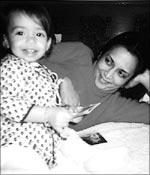Much before Deepa Mehta's Water set a record for Hindi language film in North America by ending its theatrical run three months ago with $5.5 million -- the next film on the list Kabhi Khushi Kabhie Gham grossed about $3.3 million -- the book Shooting Water had already become a success in its own right.
The book, by Mehta's only child Devyani Saltzman, had received solid reviews from many publications, with the influential trade publication Publishers Weekly giving it a starred review (only about 10 percent of the over 100 books reviewed by it each week get a star). 'A lush, evocative memoir," the weekly said.
The compellingly readable and often heart-tugging book is a story of a divorced couple (Deepa Mehta and Paul Saltzman) and the difficult decision Devyani had to make about choosing which parent to live with when she was just about 11.
In 1999, Mehta invited her to Benares to be part of the Water crew. But the mother-daughter reunion did not have an auspicious time in India. Devyani was 19 then.
"The three months of filming," she writes in her book, "would be the longest time my mother and I would have spent together in 80 years."
 But that was just a hope because the Benares sojourn lasted just a week. And to say it was a traumatic week would be a understatement. And yet through the troubles and subsequent years, the mother-daughter bond grew steadily.
But that was just a hope because the Benares sojourn lasted just a week. And to say it was a traumatic week would be a understatement. And yet through the troubles and subsequent years, the mother-daughter bond grew steadily. The book, which carries the secondary title A Memoir of Second Chances, Family and Filmmaking, is also a testimony how the reviving relationship was tested, challenged and blossomed since the Benares days.
It is also a diary of the movie abandoned in 1999 following protests in Benares by Hindu groups who feared it was ridiculing their religion and how it was revived four years later and shot in Sri Lanka with a new cast, an intriguing name River Moon, and no publicity.
Deepa Mehta's current husband David Hamilton, who also is the film's producer told me in Canada at the Toronto International Film Festival that while many producers hire publicists to boost their film's image in the early stages of the production, he hired people to deflect attention from his film.
"I am the only person who has been with the film from the moment it was conceived and stayed with it even after it has been released and declared a hit. I was there from scratch to the final edit," 27-year-old Devyani Saltzman, who is primarily a photo journalist and freelance writer. Her articles have appeared in newspapers like The Globe and Mail.
"I was there when it was abandoned, and my mother's life was threatened. I was there when my mother went through deep anguish, learned to put the bitter experience behind her, and few years ago suddenly decided she wanted to make the film after all. I was there helping her in Sri Lanka, and I was there even after the film was released," she added.
She visited over 100 bookshops in Canada and America to promote her book and speak about the film.
"More than the success of my own, I am extremely happy for the way film has been received in America, Canada and Australia," she said speaking from her home in Toronto. "I am sure the film will do very well in Britain and wherever it will be opening in the next few months, especially India."
nt>
 "I
"I am very happy for Deepa Mehta, as my mother, and as a filmmaker," Devyani continued. "She is rightly being celebrated."
A reporter points out to Devyani, who has a degree in Human Science from Oxford University, that the book is also about healing. It is about how the young girl, ordered by a Canadian court to choose between her father and mother chose the former but who also came to realise the importance of mending fences with her mother and started loving her all over again. And it is a book about how Mehta herself healed, making a light-hearted film Bollywood/Hollywood before resuming the production of Water.
"On a personal level, I wanted to focus on the pain of growing up a child of divorced parents who had to choose to live with just one parent," she continues. "And wherever I have gone, I have met young people, children of divorced parents from a wide range of backgrounds, who have told me they could connect to the book." She receives letters and e-mails from boys and girls from broken families.
She is also glad that academics and writers such as Sara Suleri Goodyear (Meatless Days), a professor of English at Yale University, endorsed the book eloquently, calling it "entrancing first book" that was "breathtaking on many counts.'
"It is a compelling diary of the politics of filmmaking in India," Goodyear wrote, "But perhaps even more compellingly a diary on the politics of love. The union of daughter and mother is represented with the rare language of authenticity."
Devyani has dedicated the book to her parents: To my mother, she writes, for introducing me to her love of books. To my father, for teaching me how to turn dreams into reality.
And Devyani was very much there when her mother turned her own dream into reality.
The daughter recalls the last day of the film's shoot in Sri Lanka where everyone was referring to the film as River Moon, with some people assuming -- since Lisa Ray was also in Bollywood/Hollywood as well as in River Moon that the film was a kind of continuation of Ray's previous film.
A Sri Lankan theatre actress who had been invited to watch the shoot "leaned over to mom after the take," Devyani writes.
"So, the film is called River Moon."
Mom put both hands on the woman's arm, and answered quietly. "No, it's called Water."
Adds Devyani: "The invisible shirt of sadness had begun to melt.'
For Deepa Mehta, who began sharing home with her daughter, much before she completed the film, "The rebirth of Water coincided happily with the rebirth of my relationship with Devyani."
She also writes in the afterword to the book: "As I read her book, I alternately smile and feel perturbed. Perturbed by her pain -- because as parents we let her down. Smile, because her honesty and courage made this redemption possible."








